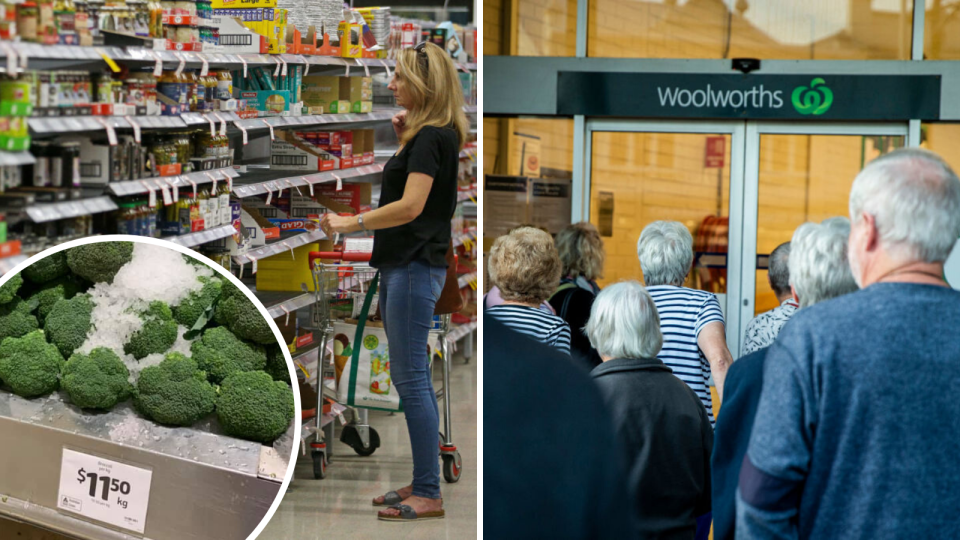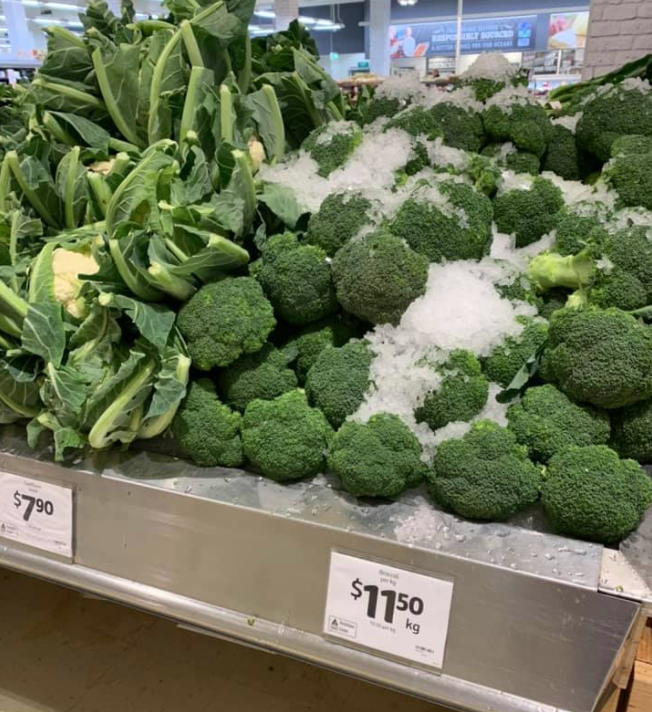$11.50 broccoli, $8 lettuce: Behind supermarkets’ ‘price gouging’

Shoppers have accused Coles and Woolworths of “price gouging” even as supermarket shelves are being emptied by shoppers panic-buying amid fears of a looming shutdown and tens of thousands of job losses.
Disgruntled shoppers on the hunt for supermarket essentials took to social media in order to air their frustrations about high prices and missing specials.
“Why are there no specials in your stores at the moment - normally aisles are full of special offers but nothing- is this not price gouging while people are struggling with making ends meet?” posted one user about Coles.
Another posted a photo of broccoli advertised for $11.50 per kilo. Broccoli is typically priced around $5 per kilo.

Some users said they paid $5 for half a head of cauliflower, and others said they saw lettuce going for up to $8 a head.
Another also said Coles’ prices were not only high, but stock was low, and asked what supermarkets were doing to help the country.
The lack of specials did not go unnoticed by shoppers, with one saying there was “not one special on the shelves” and accused Woolworths of “profiteering”.
Supermarkets respond
A spokesperson for Woolworths said that there were multiple factors behind the price rise of produce, such as the drought and bushfire seasons impacting supply.
“Due to pressures throughout the horticultural supply chain caused by drought, unseasonal weather and an unprecedented spike in demand, we're currently seeing an impact on the availability of some fresh fruit and vegetable lines,” the spokesperson said.
“This has led to higher wholesale costs for some fruit and vegetable lines across the market and we're working closely with our growers to help manage this as best we can.
“We understand the uncertainty facing households right now and remain focused on offering quality Australian grown food to our customers at competitive prices.”
A Coles spokesperson told Yahoo Finance that the drought had hit Australian producers hard.
“We are seeing upward price pressures across many agricultural categories as a result of the sustained drought across many of our producing regions.
“In the case of produce, much of what our hard-working supplier partners are harvesting now was planted during tough drought conditions,” the spokesperson said.
This is particularly true of vegetables such as leafy greens, broccoli, beans and corn.
Meanwhile, “extreme hot weather” during Christmas and January saw the volume of tomatoes, capsicums and cucumbers impacted.
“Our suppliers are enjoying more favourable growing conditions over recent weeks and we are confident that vegetable volumes will improve.”
“For meat, the sustained drought and record low herd numbers has also put upward pressure on livestock costs.”
‘Not price gouging’
The head of Australia’s competition watchdog also sought to assure shoppers that supermarkets’ higher prices did not appear to be “price gouging”.
“We've had a lot of feedback that prices, particularly of fresh produce, have gone up,” Sims told Fairfax Media.
“The story we're getting is that's due to flow on from the drought and the bushfires, and also the continual de-stocking when it comes to products such as meat. So that all seems logical.”
Any price rises will be scrutinised in order to make sure they are going to producers, not to supermarket giants’ bottom line, he added.
“We want to check if prices are going up a bit that it's really the farmers who are benefiting,” Sims said.
"If prices are going up and there's no change in margin at supermarkets or wholesalers and it's all benefiting farmers, that's okay. I don't think anybody's going to begrudge the farmers making a bit more money at the moment or recovering past losses."
Where to shop
The Council for Small Business Organisations (COSBOA) has urged shoppers to shop at independently run grocers, convenience stores and smaller supermarkets.
“We need to ensure the needs of all outlets are considered, not just the big ones,” said COSBOA CEO Peter Strong.
He added that this was also a health issue as higher volumes of shoppers congregated at large supermarkets.
“The health issues and social distancing is much more easily achieved in the suburbs. The home delivery services and support of aged care facilities by the local butchers and grocers and other outlets is rarely mentioned but is vitally important,” he said.
“We are hearing that the duopoly has cornered the market on items such as Perspex, needed for safety barriers and has purchased whole farm lots of potatoes. This creates problems for small business in the suburbs.”
Smaller stores may also open for longer hours as they shift their business model to deal with the crisis, he added.
Make your money work with Yahoo Finance’s daily newsletter. Sign up here and stay on top of the latest money, news and tech news.
Follow Yahoo Finance Australia on Facebook, Twitter, Instagram and LinkedIn.

 Yahoo Finance
Yahoo Finance 
